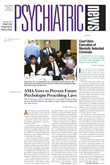Effective January 1, group health plans in New Hampshire will be required to cover treatment for substance abuse and an expanded list of psychiatric disorders.
New Hampshire Gov. Jeanne Shaheen (D) signed an amendment (HB 672) in May to a 1994 parity law that expands the list of “biologically based” psychiatric disorders to include anorexia nervosa, bulimia nervosa, and posttraumatic stress disorder.
New Hampshire is one of 35 states with a parity law and one of 15 states whose laws mandate substance abuse treatment coverage, according to APA’s Division of Government Relations.
The 1994 New Hampshire law required parity in health insurance coverage for eight mental illnesses: schizophrenia, schizoaffective disorder, major depressive disorder, bipolar disorder, paranoia and other psychotic disorders, obsessive-compulsive disorder, panic disorder, and pervasive developmental disorder, or autism.
“The amended parity law is a significant improvement because many group health plans don’t cover treatment for PTSD, eating disorders, or substance abuse. The law will improve access to treatment for hundreds of patients with these disorders, which in turn will reduce some of the adverse consequences,” said Alexander de Nesnera, M.D., immediate past president of the New Hampshire Psychiatric Society, in an interview.
For two years, through holding meetings, providing testimony, and funding an actuarial study, a mental health coalition that includes the New Hampshire Psychiatric Society lobbied the state legislature to support the bill. Other coalition organizations represent psychologists, psychiatric nurse practitioners, psychiatric social workers, pastoral psychotherapists, clinical mental health counselors, substance abuse counselors, family therapists, and patient advocates, according to de Nesnera.
Beginning next January, group health plans are also required to provide an inpatient and outpatient detoxification and rehabilitation benefit for patients with chemical dependency and alcoholism, said de Nesnera.
“We left it up to the health insurance plans to determine how many inpatient days and outpatient visits they will cover,” he said. “The coalition would have preferred full parity for substance abuse benefits, but we felt that the mandated benefit was a good first step. But we may attempt to further amend the provision if we don’t like the outcome.”
The results of the actuarial study showed that enactment of full parity for mental disorders and substance abuse would increase employers’ health insurance costs by no more than 1 percent, said de Nesnera.
The actuarial data confirmed what parity supporters suspected but didn’t convince conservative House Republicans to vote for the amendment. “When a stalemate between the House and Senate occurred, the psychiatric society offered to allow employers whose annual health insurance costs increased by more than 2 percent to opt out of compliance with the law,” said de Nesnera.
“We suggested the opt-out proposal because we firmly opposed dropping substance abuse treatment benefits from the bill, which some coalition members suggested. Fortunately, negotiations proceeded so that the bill passed without any opt-out clause.”
